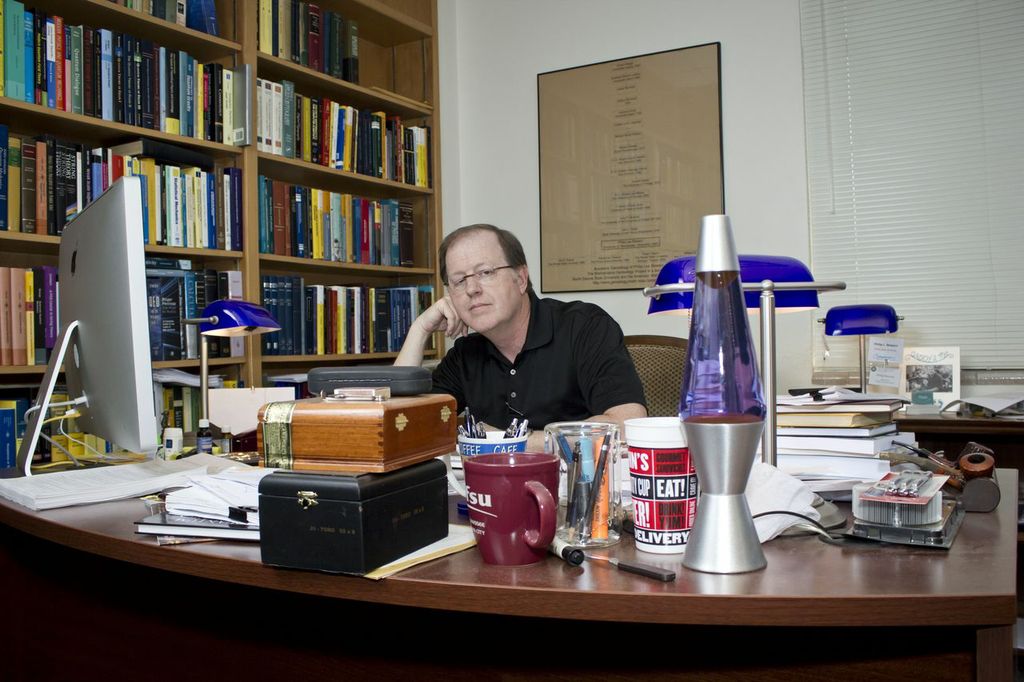Phil Bowers

After serving as Associate Chair from August 1999 to August 2005, and as Chair from August 2005 to August 2012, Dr. Phil Bowers said he has a new appreciation for the work administrators do. Although he looks forward to getting back to his research and writing, his years spent as Chair were valuable, both to him and to the department. Even as he faced challenges such as budget concerns, Bowers was able to see many of his goals realized during his two terms as Chair.
Going into his first three-year term, Bowers said he had specific goals in mind: hiring new faculty, getting the budget in order, procuring new computer and office equipment, overhauling the administrative structure, and giving fairer credit for teaching across the department. He didn't take the job lightly, and began his term with a list of these goals and a process by which to tackle them.
Owing to budget constraints across the university in 2008, he had to shift some priorities (the number of new hires possible) but found in himself an unexpected penchant for certain areas of the job, such as managing the budget. Taking on the arduous and somewhat unfamiliar role of Chair would seem daunting to some, but Bowers reflected, saying "I just jumped into the job and made it my own. I think I have a good eye for budgets." He was able to keep the department strong even through what he aptly called "the lean years," as well as making possible four new hires in his first term, which did much to renew vigor in the department. He also recalled another success - the acquisition of new office and computer equipment. Bowers pointed out the great cooperation of the Dean and other administrators in facilitating the new equipment and felt he left the department in good shape in terms of technology.
Another of his term goals, fairer credit for teaching, was important to him as he sought to validate interaction in the department not necessarily regarded at the same level as traditional classroom time. During his time as Chair, Bowers was able to help revise that system of innovative scheduling so that seminars, work with graduate students, and administrative tasks could be recognized as contributions to teaching within the department, with faculty schedules modified to reflect those contributions.
"Being a good manager of people is probably one of the hardest jobs on campus. You've got to be fair, honest, above board. Sometimes you just have to make a decision and move on."Phil Bowers
A hefty part of his position, of course, was negotiating and managing resources with the Dean. He identified his biggest challenge of the two terms as hiring. While he began his work as Chair with 44 faculty members, he left with 35. He said of the faculty numbers, "We were at a critical point." However, he didn't wait for others to fix the problem, or resign himself to complaisance. Instead, realizing the faculty simply could not shrink any further, Bowers created a document making a case for two new hires. As a result, the Dean found the funds. In fact, the need for new hires remains the issue Bowers views as most important as he passes the role of Chair on to Dr. Xiaoming Wang. He emphasized a focus on building a strong department, saying "We manage a large graduate student population, and we need to make sure we grow the graduate and undergraduate faculty." As the Math department provides one of the largest service components in the university through its course offerings, he'd really like to see that growth take place. "It'd be great for us to grow back to that size."
Reflecting on his uniquely administrative role in the department during his two terms, Bowers said, "When I became Chair, I started seeing the inner workings of things." The greatest challenge he faced individually, he recalled, was to keep his research going. Time spent in the office and with other members of the department simply didn't leave open the large blocks of time that foster research. He did begin work on a book as an outlet for those research-oriented desires, as well as continuing in his teaching responsibilities. Hosting long meetings, dealing with graduate funding requests, and managing interpersonal matters, all challenging tasks, helped Bowers develop greater understanding of what administrators do: "I have a different view of that now." He continued, "Being a good manager of people is probably one of the hardest jobs on campus. You've got to be fair, honest, above board. Sometimes you just have to make a decision and move on."
While preparing to complete his second term, Bowers made time to interact with the incoming Chair, Dr. Xiaoming Wang. "I had long conversations with Xiaoming. I actually have a list of little bits of wisdom that I passed on," he recalled. The list, including both found wisdom and Bower's own aphorisms, seems a great help to anyone facing the new challenges of managing departmental funds, time, and people, while still maintaining an optimistic approach. And while Bowers looks forward to getting back those big blocks of time for research and writing, he said, "I did enjoy being Chair. I hope I did a service to the department." It's certainly clear that he did.

